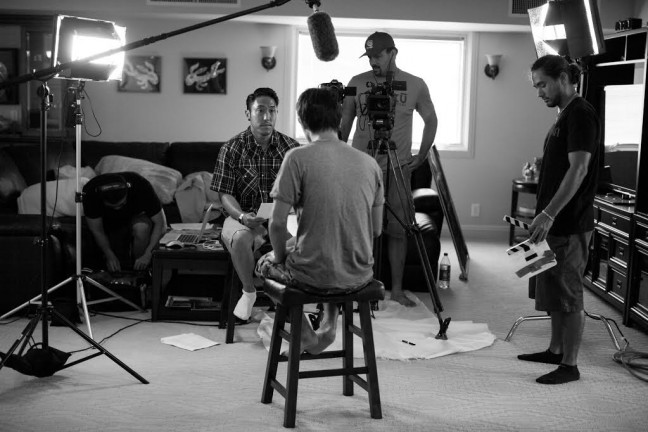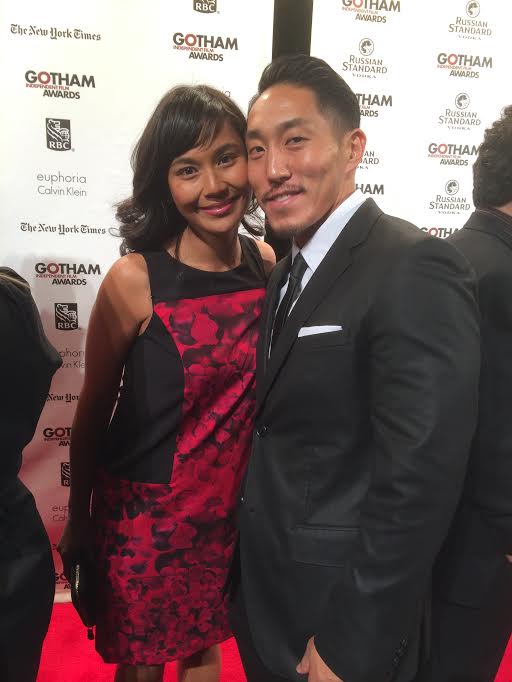
We interview filmmaker Tadashi Nakamura, who recently won the Audience Award at the Gotham Independent Film Awards in New York for his documentary, Jake Shimabukuro: Life on Four Strings about the Hawaiian ukulele virtuoso. Here, Tad talks about the best moments from the awards, his dream project, advice to future independent filmmakers, and working with CAAM.
M: Can you tell me a little bit about what it was like being at the (Gotham Independent Film) Awards and winning the Audience Award? What were some of your favorite moments from the event?
Definitely the highlights were actually getting to talk to (filmmaker) Ryan Coogler and (actor) Michael B. Jordan. Just being such a fan of Fruitvale Station, the film, definitely the biggest highlight was meeting people from that team. Also being able to represent CAAM (the Center for Asian American Media) and PIC (Pacific Islanders in Communications) and just Asian American documentaries. Besides our film, Ramona Diaz’s documentary on Arnel Pineda (Don’t Stop Believin’: Everyman’s Journey) was also nominated. It was kind of cool to have two of the five of films nominated both be Asian American-directed documentaries. It felt good to represent the community in a space like that. After we did the red carpet, we just started going up to people and asking them if we could take pictures with them and just telling them that we were fans. What was even cooler was the Audience Award was the first award that was announced. So it was kind of like, we went and said hi to these people that we were fans of, and the first award I went up to get it, so I think they were like, ‘That’s the guy who just asked to take a picture with me.’ After the awards, all those same people that we kind of went up to as fans, they kind of came up to us more as colleagues.

M: In your acceptance speech, you end with “Rest in Power, Oscar Grant.” Can you tell us more about that?
T: I was always told and taught to utilize whatever platform you have to voice, to represent, our community. And I think for me, it was an honor to be in the same category as Fruitvale Station, which was the film on Oscar Grant’s life. I wanted to pay my respects to their film, and the legacy and life of Oscar Grant. But also wanted to show that Oscar Grant isn’t just a brown and black hero or martyr or issue, in terms of seeking justice for his death. It was a spur of the moment thing, but it was the fact that I had just been talking to the people who made Fruitvale Station, and also wanted to pay tribute to that.
M: Can you talk a little bit about what projects you are currently working on?
T: Currently working on two big projects. One is, working with CAAM again, it’s on a film that’s being produced by Visual Communications in association with the Center for Asian American Media. It’s going to be a retrospective of the last 50 years of independent Asian American cinema. It’s a big scope, a lot of films and information and history to cover within an hour piece. But I’m really excited about it, there’s nothing out there like it of its kind. It’s a film I wish existed what I was an Asian American studies student. It will be great because I will be able to work with CAAM and Visual Communications, but also really go through the history of Asian American cinema that has inspired me and other filmmakers. I also just started production on another documentary in Hawaii. This one is with Oiwi TV, which is one of the production companies that worked on the Jake film in Hawaii. We’re doing a documentary on two graffiti artists named Prime and Estria. They’re doing a series of murals on all the islands in Hawaii. For each mural, they’ll be working with local Hawaiian youth in the area. What they’re going to be doing is incorporating Hawaiian chants and meles and kind of creation stories as the content for the murals. So they’re going to be utilizing public art, aerosol art, as a bridge between youth and traditional Hawaiian culture.
M: That sounds really cool. I’m wondering about your parents’ influence on you. (Robert Nakamura and Karen Ishizuka, both filmmakers). Did they influence you to choose this field, and how did they influence what you choose for your topics for your films?
T: They’ve been a huge influence and inspiration. Now it’s a direct one. Before, it was kind of indirect. As much as I was surrounded by Asian American, or specifically, Japanese American documentary filmmaking, growing up, I never thought I would be doing this. It wasn’t until I was an Asian American studies student at UCLA that through student activism that I got involved with documentary as a tool to build community or support campaigns that we were organizing around. So my entry into filmmaking was community-based, was student organizing-based. That still stands for me now that I was grounded from my parents, on measures of success for your films aren’t awards or getting picked up by a distribution company, but it’s how useful that film could be to the community that it can serve. The community—community meaning, the specific Japanese American community in L.A. or the broader Asian American community in the country—I feel like I have been very supported as a filmmaker. Validation from the community is as good as it gets for me.
M: Do you see yourself continuing to make films focusing on the Asian American community? What are some of your dream projects, either relating to Asian America issues or communities or individuals, or outside of that?
T: I think almost all the projects I’d love to do are based within the Asian American or Pacific Islander community. My thing too, is, before, and I still kind of feel this way—well the main reason why all my films at this point have been on the Japanese American community is that I don’t necessarily feel quite comfortable doing a film on another community, or I feel that there’s someone from that community that could probably tell the story better. So this project with Estria and Prime in Hawaii is kind of the first film that I’m doing outside of the Japanese American community, but the only reason I feel comfortable doing it is because I’m doing it with other Native Hawaiian filmmakers that I feel could provide that perspective. But in terms of dream projects, I’m a big fan of sports documentaries. As an undergrad at UCLA, I was part of a tutoring program at Carson High School, in Carson, California, which has a long history, and big population, of the Samoan American community. So my dream kind of film would be to do a documentary on the Carson High School football team and follow them for a season and through that, document the Samoan American community, and specifically for the young men in that community, the intersection between football, street violence and church.
M I have one more question. What’s your advice to people who want to get into independent filmmaking?
T: I would definitely say, to really make films that you’re passionate about. Not necessarily make films that you feel will have a large audience or that will sell well. I think the best stories are told by people who really believe in them. Because realistically, in a community documentary realm, or even in a documentary realm in general even on a mainstream level, there’s not that much money to be made off of these films. You’re not going to get rich of it, you’re not going to get famous off of it. So might as well do something that’s fulfilling for yourself or fulfilling for the people that you’re documenting. Also too, filmmaking is one of those things that you never get better until you just kind of jump in and start making films. As much as funding is a big obstacle, I think a lot of people probably put too much dependence on securing funds before they start making the film. I would suggest just go ahead and just try to do it out of pocket. In terms of skill building and craft building, you’ll learn more by that than anything else.
M: Did you want to add anything else before we close the interview?
T: Yeah. This film is a CAAM production, co-produced by Pacific Islanders in Communications. I just always want to thank CAAM and Don Young, the producer of the film. They really took a chance hiring me to direct and edit the film. Before this film, I hadn’t done an hour-long piece, or especially a broadcast quality piece. Not only the Gotham Awards, but just things like premiering at the Castro (Theatre) and going to PBS headquarters in D.C., there’s been so many experiences that I’ve grown from as a filmmaker and I think it’s all because they gave me a shot.
– Momo Chang
This interview has been edited for length and clarity.
Here’s the video of Tad’s acceptance speech!




